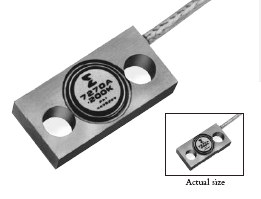 ABOVE: Endevco 7270A-200K accelerometer
ABOVE: Endevco 7270A-200K accelerometer
We’ve posted here previously about the indictment of Qing Li for allegedly attempting to export Endevco 7270A-200K accelerometers without a license to China. That case is proceeding to trial, and the trial court rejected* Qing Li’s claim that the United States Munitions List, as applied in her case, was unconstitutionally vague.
The court characterized defendant Qing Li’s argument as follows:
Defendant argues that the court should dismiss the indictment because the [Arms Export Control Act] and its implementing regulations are unconstitutionally vague as applied to her. Specifically, Defendant argues that a person of ordinary intelligence could not determine that the Endevco accelerometer device is a “military accelerometer” requiring an export license. In support of this argument, she attaches to her motion two pages of manufacturer-provided “public information” regarding the Endevco accelerometer. She argues that “[a] person of ordinary intelligence would likely deem that data sheet incomprehensible,” and that the sheet does not indicate whether the device is for military or weapons use. (Mot. at 3.) She also emphasizes the allegation that even prosecutors must request information from the State Department to determine if an item is on the list.
I haven’t looked at the trial court record but the Endevco “public information” regarding the accelerometer is presumably this data sheet which, admittedly, doesn’t state that the item is on the USML or is export-controlled. And, of course, I’m sure that the argument that even the prosecution had to ask the State Department whether this accelerometer was USML or not elicited some sympathetic nods.
The court quite properly declined to make this a case about whether the USML description of military accelerometers is unconstitutionally vague, stating:
The court notes that not only does Defendant fail to cite a single case in which the court found the AECA unconstitutionally vague, her argument emphasizes the premature and misdirected nature of her challenge. Because the charging statute contains a scienter requirement (willful violation), innocent, accidental, or unknowing exportation of a proscribed device cannot support a conviction. Therefore, the relevant inquiry consists not of an abstract analysis of constitutional vagueness, but what Defendant knew. Such an inquiry will be undertaken by a jury and based on the evidence adduced at trial. See Lee, 183 F.3d at 1032-33 . Here, the factual record has yet to be developed. Until an evidentiary record is created, the court cannot determine whether Defendant “in fact had fair notice that the statute and regulations proscribed [her] conduct.” Hsu, 364 F.3d at 196. Application of these cited controlling authorities, in essence, renders Defendant’s constitutional challenge moot at this juncture.
Readers of this blog with sharp memories may recall, as we discussed here, that the indictment alleged some facts that suggest that Qing Li might indeed have known that the accelerometer was indeed covered by the USML. The undercover agent from whom Ms. Li was trying to purchase the accelerometer allegedly told her that the export required a license and he didn’t think one could be obtained. And although she appeared to walk away from the transaction at that point, citing the “risk” involved, the indictment alleged that she continued to direct the negotiations between the undercover agent and a contact in China.
*Westlaw subscription required
 For all the time that we export lawyers spend trying to inculcate into our clients the concept of export red flags, it’s heartening to see that pay off. And it certainly did payoff in the case of two Chinese citizens stopped at LAX carrying suitcases stuffed to overflowing with night vision cameras. The not-so-swift attempted exporters had used a company called Printing Plus Graphics as their front. I suppose that was better than using Panda Express as a front, but not much.
For all the time that we export lawyers spend trying to inculcate into our clients the concept of export red flags, it’s heartening to see that pay off. And it certainly did payoff in the case of two Chinese citizens stopped at LAX carrying suitcases stuffed to overflowing with night vision cameras. The not-so-swift attempted exporters had used a company called Printing Plus Graphics as their front. I suppose that was better than using Panda Express as a front, but not much. 
 Posted by
Posted by  Category:
Category: 

 The saga of the government’s ill-fated prosecution of Alex Latifi and his company Axion Corporation continues. The federal district court judge delivered yet another forceful gavel whack to the hands of the prosecutors and
The saga of the government’s ill-fated prosecution of Alex Latifi and his company Axion Corporation continues. The federal district court judge delivered yet another forceful gavel whack to the hands of the prosecutors and  This post is only peripherally related to export law, but it does involve Iran, blocked assets, terrorism, Persian antiquities and a fascinating conundrum of statutory construction. So bear with me, you won’t be sorry.
This post is only peripherally related to export law, but it does involve Iran, blocked assets, terrorism, Persian antiquities and a fascinating conundrum of statutory construction. So bear with me, you won’t be sorry.



